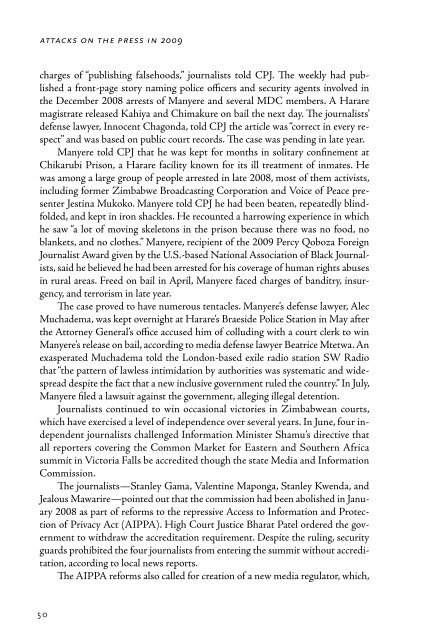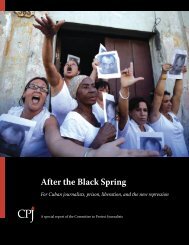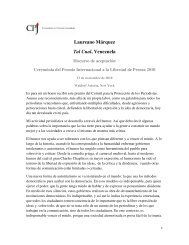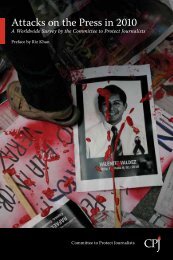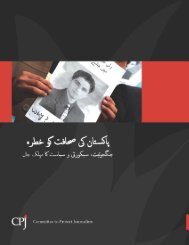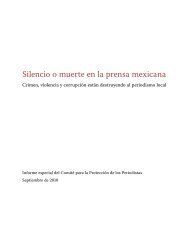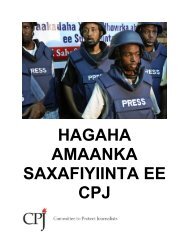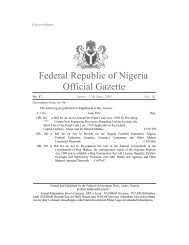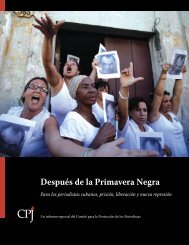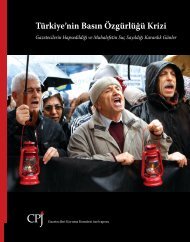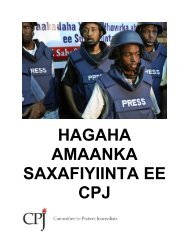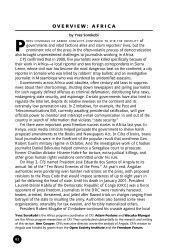Attacks on the Press - Committee to Protect Journalists
Attacks on the Press - Committee to Protect Journalists
Attacks on the Press - Committee to Protect Journalists
- No tags were found...
Create successful ePaper yourself
Turn your PDF publications into a flip-book with our unique Google optimized e-Paper software.
attacks <strong>on</strong> <strong>the</strong> press in 2009africa: zimbabwecharges of “publishing falsehoods,” journalists <strong>to</strong>ld CPJ. The weekly had publisheda fr<strong>on</strong>t-page s<strong>to</strong>ry naming police officers and security agents involved in<strong>the</strong> December 2008 arrests of Manyere and several MDC members. A Hararemagistrate released Kahiya and Chimakure <strong>on</strong> bail <strong>the</strong> next day. The journalists’defense lawyer, Innocent Chag<strong>on</strong>da, <strong>to</strong>ld CPJ <strong>the</strong> article was “correct in every respect”and was based <strong>on</strong> public court records. The case was pending in late year.Manyere <strong>to</strong>ld CPJ that he was kept for m<strong>on</strong>ths in solitary c<strong>on</strong>finement atChikarubi Pris<strong>on</strong>, a Harare facility known for its ill treatment of inmates. Hewas am<strong>on</strong>g a large group of people arrested in late 2008, most of <strong>the</strong>m activists,including former Zimbabwe Broadcasting Corporati<strong>on</strong> and Voice of Peace presenterJestina Mukoko. Manyere <strong>to</strong>ld CPJ he had been beaten, repeatedly blindfolded,and kept in ir<strong>on</strong> shackles. He recounted a harrowing experience in whichhe saw “a lot of moving skelet<strong>on</strong>s in <strong>the</strong> pris<strong>on</strong> because <strong>the</strong>re was no food, noblankets, and no clo<strong>the</strong>s.” Manyere, recipient of <strong>the</strong> 2009 Percy Qoboza ForeignJournalist Award given by <strong>the</strong> U.S.-based Nati<strong>on</strong>al Associati<strong>on</strong> of Black <strong>Journalists</strong>,said he believed he had been arrested for his coverage of human rights abusesin rural areas. Freed <strong>on</strong> bail in April, Manyere faced charges of banditry, insurgency,and terrorism in late year.The case proved <strong>to</strong> have numerous tentacles. Manyere’s defense lawyer, AlecMuchadema, was kept overnight at Harare’s Braeside Police Stati<strong>on</strong> in May after<strong>the</strong> At<strong>to</strong>rney General’s office accused him of colluding with a court clerk <strong>to</strong> winManyere’s release <strong>on</strong> bail, according <strong>to</strong> media defense lawyer Beatrice Mtetwa. Anexasperated Muchadema <strong>to</strong>ld <strong>the</strong> L<strong>on</strong>d<strong>on</strong>-based exile radio stati<strong>on</strong> SW Radiothat “<strong>the</strong> pattern of lawless intimidati<strong>on</strong> by authorities was systematic and widespreaddespite <strong>the</strong> fact that a new inclusive government ruled <strong>the</strong> country.” In July,Manyere filed a lawsuit against <strong>the</strong> government, alleging illegal detenti<strong>on</strong>.<strong>Journalists</strong> c<strong>on</strong>tinued <strong>to</strong> win occasi<strong>on</strong>al vic<strong>to</strong>ries in Zimbabwean courts,which have exercised a level of independence over several years. In June, four independentjournalists challenged Informati<strong>on</strong> Minister Shamu’s directive thatall reporters covering <strong>the</strong> Comm<strong>on</strong> Market for Eastern and Sou<strong>the</strong>rn Africasummit in Vic<strong>to</strong>ria Falls be accredited though <strong>the</strong> state Media and Informati<strong>on</strong>Commissi<strong>on</strong>.The journalists—Stanley Gama, Valentine Map<strong>on</strong>ga, Stanley Kwenda, andJealous Mawarire—pointed out that <strong>the</strong> commissi<strong>on</strong> had been abolished in January2008 as part of reforms <strong>to</strong> <strong>the</strong> repressive Access <strong>to</strong> Informati<strong>on</strong> and <strong>Protect</strong>i<strong>on</strong>of Privacy Act (AIPPA). High Court Justice Bharat Patel ordered <strong>the</strong> government<strong>to</strong> withdraw <strong>the</strong> accreditati<strong>on</strong> requirement. Despite <strong>the</strong> ruling, securityguards prohibited <strong>the</strong> four journalists from entering <strong>the</strong> summit without accreditati<strong>on</strong>,according <strong>to</strong> local news reports.The AIPPA reforms also called for creati<strong>on</strong> of a new media regula<strong>to</strong>r, which,with private media representati<strong>on</strong>, could act more independently. The Media andInformati<strong>on</strong> Commissi<strong>on</strong> was a no<strong>to</strong>riously repressive agency that had bannedseveral prominent newspapers, including <strong>the</strong> Daily News, <strong>the</strong> Daily News <strong>on</strong> Sunday,<strong>the</strong> Tribune, and <strong>the</strong> Weekly Times. But <strong>the</strong> new regula<strong>to</strong>ry agency had notbeen established by late year; nei<strong>the</strong>r <strong>the</strong> dormant private papers nor new privatepublicati<strong>on</strong>s could obtain licenses <strong>to</strong> operate.In July, a special government committee reviewed <strong>the</strong> case of <strong>the</strong> bannedDaily News, <strong>on</strong>ce Zimbabwe’s leading private daily but shuttered in 2003, according<strong>to</strong> local news reports. The paper’s exiled edi<strong>to</strong>r-in-chief was still waiting foran outcome in late year. “We have not gotten <strong>the</strong> license yet, <strong>on</strong>ly <strong>the</strong> eligibilityfor a license,” said <strong>the</strong> edi<strong>to</strong>r, Geoff Nyarota, a former CPJ Internati<strong>on</strong>al <strong>Press</strong>Freedom Awardee. In c<strong>on</strong>trast, a new state-run tabloid, H-Metro, was allowed <strong>to</strong>launch in September without a license, according <strong>to</strong> news reports.The government also failed <strong>to</strong> implement reforms <strong>to</strong> <strong>the</strong> Broadcasting ServiceAct, which were enacted in January 2008 <strong>to</strong> allow private outlets <strong>to</strong> obtain broadcastlicenses. The year ended, as it began, with a virtual state m<strong>on</strong>opoly <strong>on</strong> broadcastmedia. The power-sharing agreement had also pledged <strong>to</strong> ensure <strong>the</strong> processing ofprivate broadcast licenses, even encouraging exile-run stati<strong>on</strong>s <strong>to</strong> apply.C<strong>on</strong>diti<strong>on</strong>s did improve for foreign publicati<strong>on</strong>s after an exorbitant cus<strong>to</strong>mduty was lifted in August. Mugabe’s government had decreed in 2008 that foreignpublicati<strong>on</strong>s were “luxury goods” subject <strong>to</strong> a 40 percent import tax. The feesharmed papers such as The Zimbabwean and its sister publicati<strong>on</strong>, The Zimbabwean<strong>on</strong> Sunday, which were edited by exiled Zimbabwean journalist Wilf Mbangaand printed in South Africa. Mbanga said <strong>the</strong> paper’s circulati<strong>on</strong> dropped from200,000 <strong>to</strong> 60,000 during <strong>the</strong> time <strong>the</strong> duty was imposed.The same m<strong>on</strong>th, <strong>the</strong> government allowed both <strong>the</strong> BBC and CNN <strong>to</strong> resumeoperati<strong>on</strong>s in Zimbabwe. The two stati<strong>on</strong>s had been banned at <strong>the</strong> heigh<strong>to</strong>f Mugabe’s farm invasi<strong>on</strong>s in 2001, when <strong>the</strong> government seized white-ownedagricultural property and transferred ownership <strong>to</strong> ruling party officials. In announcing<strong>the</strong> decisi<strong>on</strong>, Informati<strong>on</strong> Minister Shamu said <strong>the</strong> government and<strong>the</strong> BBC had “acknowledged <strong>the</strong> need <strong>to</strong> put behind us <strong>the</strong> mutually ruinous relati<strong>on</strong>shipof <strong>the</strong> past,” according <strong>to</strong> local news reports.One independent stati<strong>on</strong>, Zimbabwe Community Radio, launched from anundisclosed locati<strong>on</strong> in March, local journalists <strong>to</strong>ld CPJ. The stati<strong>on</strong> broadcastin <strong>the</strong> country’s three main languages: Ndebele, Sh<strong>on</strong>a, and English.5 05 1


